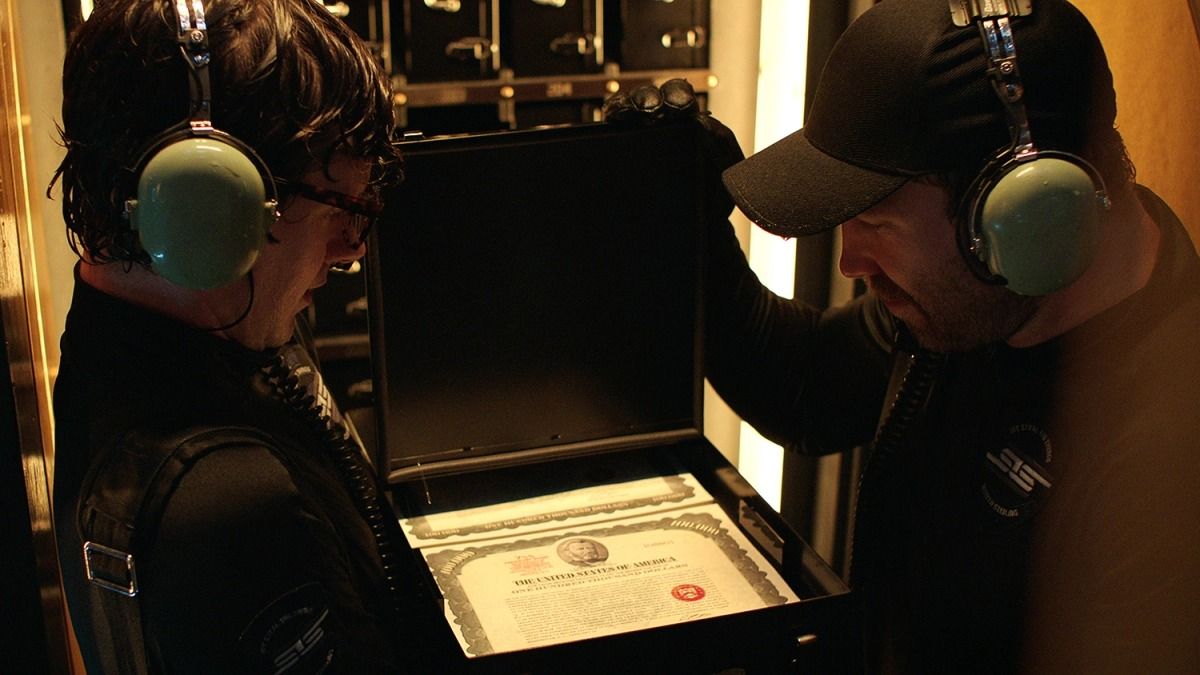

Finance
Who Is A Certifying Officer For Savings Bonds
Modified: December 30, 2023
Learn about the role of a certifying officer for savings bonds and how they contribute to the financial management of these investments. Find out more about finance and savings bonds today!
(Many of the links in this article redirect to a specific reviewed product. Your purchase of these products through affiliate links helps to generate commission for LiveWell, at no extra cost. Learn more)
Table of Contents
Introduction
When it comes to managing and overseeing financial transactions, having qualified and trusted individuals is crucial. In the realm of savings bonds, one such important role is that of a Certifying Officer. A Certifying Officer plays a key role in the savings bond program by verifying and certifying the authenticity and validity of various financial transactions.
In this article, we will delve into the world of Certifying Officers, exploring their definition, responsibilities, qualifications, and training. We will also shed light on how individuals can become Certifying Officers and discuss the significance of their role in the savings bond program. So, let’s dive in and gain a better understanding of who a Certifying Officer is and the essential role they play.
Nowadays, savings bonds continue to be a popular investment option for individuals who want to secure their financial future. These bonds provide a safe and stable investment opportunity, with guaranteed returns. However, to ensure the integrity of the savings bond program, it is essential to have Certifying Officers who can oversee and validate various financial transactions related to these bonds.
A Certifying Officer is an individual responsible for verifying and certifying the authenticity and accuracy of financial transactions involving savings bonds. They act as a trusted authority in confirming the validity of documents, including bond applications, requests for redemptions, and changes in bond ownership.
The role of a Certifying Officer goes beyond simply stamping documents or signing forms. They are entrusted with the responsibility of ensuring the legitimacy of the transactions and protecting the interests of both the bondholders and the government. By acting as a gatekeeper, Certifying Officers play a crucial role in maintaining the integrity and security of the savings bond program.
Definition of a Certifying Officer
A Certifying Officer is an individual appointed by an authorized financial institution or organization to verify and certify the authenticity and accuracy of financial transactions involving savings bonds. They act as a trusted authority responsible for ensuring the integrity and security of the savings bond program. The role of a Certifying Officer is crucial in safeguarding the interests of bondholders and the government.
As a Certifying Officer, one of the primary duties is to verify the identity and eligibility of individuals seeking to invest in or make changes to their savings bond holdings. They carefully review and authenticate the supporting documents provided, such as identification proof and authorization forms, to ensure compliance with the legal requirements.
Additionally, Certifying Officers play a vital role in verifying and certifying bond redemptions, where bondholders request to redeem their bonds and receive the corresponding payment. They carefully scrutinize the redemption forms, ensuring that all necessary information is accurately filled out and that the bondholder meets the eligibility criteria for redemption.
Another responsibility of a Certifying Officer is to attest to changes in bond ownership. This includes verifying the legitimacy of requests to transfer ownership from one individual to another, whether due to gift, inheritance, or any other authorized reason. They review the necessary documentation and ensure that all legal requirements are met before certifying the ownership transfer.
In some cases, Certifying Officers may also be involved in certifying changes to bond registrations, such as updating beneficiary information or correcting errors in bondholder details. Their role is to verify the accuracy of the requested changes and ensure that they align with the bondholder’s intentions.
It is important to note that the specific responsibilities of a Certifying Officer may vary depending on the policies and procedures of the financial institution or organization they are associated with. However, their overall objective remains the same, which is to maintain the integrity and security of savings bond transactions.
Overall, a Certifying Officer serves as a trusted authority in the savings bond program, ensuring that all financial transactions related to savings bonds are legitimate, accurate, and compliant with the governing regulations. Their role is indispensable in maintaining the confidence and trust of bondholders in the savings bond program.
Responsibilities of a Certifying Officer
The role of a Certifying Officer comes with a range of responsibilities that are essential for maintaining the integrity and security of the savings bond program. These responsibilities include:
- Verification and certification of bondholder identity: Certifying Officers are responsible for verifying the identity of individuals who wish to invest in savings bonds or make changes to their bond holdings. This involves carefully reviewing identification documents, such as government-issued ID cards, passports, or social security cards, to ensure that the person is eligible to participate in the program.
- Certification of bond applications: When individuals apply for savings bonds, Certifying Officers play a crucial role in verifying and certifying the accuracy of the bond applications. They ensure that all necessary information, such as the bondholder’s name, address, social security number, and the amount to be invested, is correctly filled out.
- Validation of bond redemptions: Certifying Officers review and validate requests for bond redemptions, where bondholders seek to cash in their savings bonds. They carefully examine the redemption forms and supporting documentation to ensure that all required information is provided and that the bondholder meets the eligibility criteria for redemption.
- Authentication of changes in bond ownership: In cases where bond ownership needs to be transferred, whether due to gift, inheritance, or any other authorized reason, Certifying Officers play a crucial role in verifying and certifying the transfer. They review relevant documentation, such as gift affidavit forms or legal documents, to ensure the legitimacy of the ownership change.
- Review and certification of changes to bond registrations: Certifying Officers are responsible for reviewing and certifying changes to bond registrations, such as updating beneficiary information or correcting errors in bondholder details. They ensure that all requested changes are accurate and comply with the bondholder’s intentions.
- Compliance with regulations and procedures: Certifying Officers must stay updated with the latest regulations and procedures related to the savings bond program. They ensure that all financial transactions are carried out in accordance with the governing laws and adhere to the policies set forth by the financial institution or organization they are associated with.
- Maintaining accurate records: Certifying Officers are responsible for maintaining accurate and up-to-date records of all transactions they certify. This includes keeping track of bond applications, redemptions, ownership transfers, and changes to bond registrations. These records serve as crucial documentation for future reference and audit purposes.
It is important to note that the specific responsibilities of a Certifying Officer may vary depending on the financial institution or organization they work for. However, their ultimate goal remains the same: to ensure the authenticity, accuracy, and compliance of savings bond transactions. By fulfilling their responsibilities diligently, Certifying Officers play a vital role in maintaining the trust and confidence of bondholders in the savings bond program.
Qualifications and Training for Certifying Officers
Being a Certifying Officer requires a combination of qualifications, skills, and knowledge to effectively carry out the responsibilities associated with the role. While specific requirements may vary depending on the financial institution or organization, the following are common qualifications and training that Certifying Officers typically possess:
- Education: Most financial institutions or organizations require Certifying Officers to have a minimum educational qualification, such as a high school diploma or equivalent. Some institutions may prefer candidates with a bachelor’s degree in finance, accounting, or a related field.
- Financial Knowledge: Certifying Officers need to have a solid understanding of financial concepts, banking practices, and regulations. They should be familiar with the intricacies of savings bonds, their features, and the applicable laws governing bond transactions.
- Ethics and Integrity: Given that Certifying Officers are entrusted with verifying and certifying financial transactions, it is essential for them to uphold high ethical standards and demonstrate integrity. They must act impartially, maintaining confidentiality and ensuring that all transactions are carried out honestly and transparently.
- Attention to Detail: The role of a Certifying Officer involves carefully reviewing and validating documents and information. They should possess strong attention to detail, ensuring that all forms are accurately completed and all supporting documents are valid and legitimate.
- Communication Skills: Effective communication is crucial for Certifying Officers to interact with bondholders, financial institution staff, and other stakeholders. They must be able to clearly explain procedures, answer inquiries, and address concerns in a professional and courteous manner.
- Training: Financial institutions typically provide comprehensive training programs to Certifying Officers to ensure they are well-equipped to carry out their responsibilities. This training includes learning about the savings bond program, relevant regulations and procedures, fraud detection techniques, and proper documentation practices.
- Continuing Education: As financial regulations and practices evolve, Certifying Officers are expected to stay updated with the latest knowledge and developments in the field. They may be required to participate in ongoing training or educational opportunities to enhance their skills and stay abreast of industry changes.
- Certifications: While not always mandatory, obtaining relevant certifications can enhance the credibility and expertise of Certifying Officers. For example, certifications in finance, compliance, or fraud examination can demonstrate a commitment to professional growth and competence.
Financial institutions or organizations may have additional specific requirements or qualifications for Certifying Officers based on their internal policies and the nature of the savings bond program. It is crucial for candidates to review the eligibility criteria and seek guidance from the institution during the application process.
By possessing the necessary qualifications, undergoing appropriate training, and continuously updating their knowledge, Certifying Officers can effectively carry out their responsibilities and contribute to the smooth operation of the savings bond program.
Becoming a Certifying Officer
If you’re interested in becoming a Certifying Officer, there are certain steps you can take to pursue this role. While specific requirements may vary depending on the financial institution or organization, the following are general steps to become a Certifying Officer:
- Educational Qualifications: Start by ensuring you meet the minimum educational qualifications required by financial institutions or organizations. Most institutions require at least a high school diploma or equivalent. Some may prefer candidates with a degree in finance, accounting, or a related field.
- Gain Financial Knowledge: Develop a strong understanding of financial concepts, banking practices, and regulations. Stay updated with the latest information related to savings bonds, including their features and the governing laws. You can achieve this through self-study, online courses, or formal education in finance or related fields.
- Acquire Experience: While not always mandatory, relevant work experience in the financial sector can strengthen your application. Consider gaining experience in roles that involve financial transactions, customer service, or compliance to develop the necessary skills and knowledge.
- Research Financial Institutions: Identify financial institutions or organizations that offer opportunities to become a Certifying Officer. Research their requirements, application processes, and any specific qualifications they may prioritize. Reach out to the institutions directly for guidance and clarification if needed.
- Apply for Open Positions: Once you have identified suitable financial institutions, submit your application for Certifying Officer positions. Prepare a well-crafted resume highlighting your qualifications, experience, and relevant skills. Tailor your application to align with the institution’s requirements and express your interest in contributing to the security and integrity of the savings bond program.
- Complete Training Programs: If selected, financial institutions typically provide comprehensive training programs for newly appointed Certifying Officers. These programs cover various aspects of the savings bond program, regulatory compliance, fraud detection, and proper documentation practices. Actively participate in the training to acquire the essential knowledge and skills required for the role.
- Continuing Education and Professional Development: As a Certifying Officer, ongoing learning is essential to stay updated with changing regulations and best practices. Seek opportunities for continuing education, attend relevant workshops or seminars, and consider obtaining certifications in finance, compliance, or related areas to enhance your professional growth and competence.
- Demonstrate Ethical Conduct: As a Certifying Officer, it is crucial to demonstrate high ethical standards and integrity. Uphold confidentiality, act impartially, and ensure that all financial transactions are carried out honestly and transparently. Comply with the institution’s policies and adhere to the regulations governing the savings bond program.
Keep in mind that the process and requirements for becoming a Certifying Officer may vary based on the financial institution or organization. Therefore, it is important to carefully review the specific qualifications and guidelines provided by the institution you are interested in.
By following these steps, developing the necessary qualifications and skills, and demonstrating a commitment to maintaining the integrity of the savings bond program, you can pave your path toward becoming a successful Certifying Officer.
Role of Certifying Officers in the Savings Bond Program
Certifying Officers play a critical role in the functioning of the savings bond program. Their primary responsibility is to verify and certify the authenticity, accuracy, and compliance of various financial transactions related to savings bonds. Let’s explore the key roles and contributions of Certifying Officers:
- Ensuring Compliance: Certifying Officers are responsible for ensuring that all financial transactions carried out within the savings bond program comply with the governing regulations and procedures. They meticulously review and validate documents, forms, and supporting information to confirm adherence to legal requirements.
- Protecting Investors: Certifying Officers act as guardians of the bondholders’ interests by meticulously verifying the identity and eligibility of individuals who wish to invest in savings bonds. Their role is vital in preventing fraudulent activities and protecting investors from potential risks.
- Authenticating Transactions: With every financial transaction, Certifying Officers carefully review and authenticate the supporting documents. This includes bond applications, redemptions, changes in bond ownership, and updates to bond registrations. Their assessment ensures that all information is accurate, complete, and legally valid.
- Preventing Fraud and Money Laundering: Certifying Officers are trained to detect and deter fraudulent activities and potential money laundering activities within the savings bond program. Through their expertise and knowledge, they identify suspicious transactions, verify the legitimacy of supporting documentation, and report any anomalies to the appropriate authorities.
- Maintaining Program Integrity: Certifying Officers play an instrumental role in maintaining the integrity and reputation of the savings bond program. By diligently carrying out their responsibilities and adhering to ethical standards, they instill trust and confidence among bondholders, financial institutions, and regulatory bodies.
- Providing Guidance and Assistance: Certifying Officers act as points of contact for bondholders and financial institution staff. They provide guidance and assistance in completing forms, understanding procedures, and addressing any concerns or questions related to savings bond transactions. Their expertise and support contribute to a smooth and efficient experience for all involved parties.
- Record Keeping and Documentation: Certifying Officers maintain accurate records of all certified transactions, including bond applications, redemptions, ownership transfers, and changes in bond registrations. These records serve as a historical reference and aid in audits or investigations if required in the future.
- Supporting Regulatory Compliance: Certifying Officers ensure that the savings bond program operates in accordance with the relevant financial regulations and guidelines. They assist in implementing and enforcing procedures to maintain compliance, including monitoring transactional activities, conducting regular audits, and reporting any irregularities.
The dedication and diligence of Certifying Officers are crucial in upholding the credibility, transparency, and security of the savings bond program. Their role not only protects the interests of individual bondholders but also safeguards the overall integrity of the program, enhancing the trust and confidence of investors.
Benefits of Having Certifying Officers
The presence of Certifying Officers in the savings bond program brings several important benefits and advantages. Let’s explore some key benefits of having Certifying Officers:
- Enhanced Security and Fraud Prevention: Certifying Officers serve as an additional layer of security to protect the savings bond program from fraudulent activities. Their expertise and attention to detail help authenticate transactions, detect potential fraud, and prevent unauthorized access or misuse of bondholder information.
- Increased Investor Confidence: The presence of Certifying Officers instills confidence among investors by ensuring the authenticity and integrity of savings bond transactions. The knowledge that their investments are being overseen by qualified professionals who verify and certify all financial transactions adds peace of mind and trust in the program.
- Improved Regulatory Compliance: Certifying Officers play a crucial role in ensuring compliance with financial regulations and guidelines related to savings bonds. Their careful review of transactions, adherence to legal requirements, and diligent record-keeping contribute to maintaining regulatory compliance and reducing the risk of penalties or legal issues.
- Efficient and Transparent Process: Certifying Officers facilitate smooth, efficient, and transparent savings bond transactions. By validating, verifying, and certifying the required documentation, they help streamline the process, reducing errors and delays. This benefits both bondholders and financial institutions by ensuring a hassle-free experience for all parties involved.
- Protection of Bondholder Interests: Certifying Officers act as advocates for bondholders, ensuring that their interests are protected throughout the savings bond program. Their diligent review of documentation and verification of identities help prevent unauthorized activities and protect bondholders from potential fraud or misconduct.
- Expert Guidance and Support: Certifying Officers provide guidance and support to bondholders and financial institution staff. They assist with completing forms, understanding procedures, and addressing any questions or concerns. Their expertise and knowledge help individuals navigate the complexities of savings bond transactions, fostering a positive customer experience.
- Audit Trail and Documentation: Certifying Officers maintain accurate and comprehensive records of all certified transactions. These records serve as an audit trail, providing a historical documentation of savings bond activities. The availability of detailed records helps with audits, investigations, and resolving any disputes or discrepancies that may arise.
- Compliance and Risk Management: Certifying Officers play a crucial role in managing compliance and mitigating risks within the savings bond program. By ensuring adherence to regulatory requirements, detecting potential fraudulent activities, and maintaining strong internal controls, they contribute to a program that operates in a compliant and secure manner.
The presence of Certifying Officers brings significant value to the savings bond program. Their expertise, attention to detail, and commitment to maintaining the integrity of transactions contribute to a secure and trusted investment environment for bondholders.
Overall, the benefits of having Certifying Officers include increased security, enhanced investor confidence, improved regulatory compliance, efficient processes, and the protection of bondholder interests. Their presence is essential to maintaining the credibility and long-term sustainability of the savings bond program.
Conclusion
In conclusion, Certifying Officers play a vital role in the savings bond program by verifying and certifying the authenticity, accuracy, and compliance of financial transactions. Their responsibilities encompass reviewing documents, validating identities, ensuring regulatory compliance, and protecting the interests of bondholders.
The presence of Certifying Officers brings numerous benefits to the savings bond program and its participants. They enhance security by preventing fraud and unauthorized access, thus increasing investor confidence. Certifying Officers contribute to regulatory compliance, ensuring that all transactions adhere to established guidelines and regulations.
Furthermore, Certifying Officers facilitate an efficient and transparent process by streamlining transactions and providing expert guidance. Their expertise and attention to detail help prevent errors, delays, and potential disputes. Certifying Officers also maintain comprehensive records, serving as an important audit trail and aiding in investigations, audits, and dispute resolution.
Ultimately, Certifying Officers are a crucial component of the savings bond program, safeguarding the integrity, security, and reputation of the program. They instill trust and confidence among bondholders, financial institutions, and regulatory bodies, contributing to a thriving and dependable investment environment.
Whether you are considering becoming a Certifying Officer or benefiting from their presence as an investor, it is evident that their role is indispensable. Certifying Officers ensure the smooth operation of the savings bond program, protect the interests of bondholders, and provide a fundamental level of security and transparency.
As the savings bond program continues to evolve, the importance of Certifying Officers in upholding its integrity and fostering investor trust remains paramount. Their dedication, expertise, and commitment ensure that savings bonds continue to be a reliable and secure investment option for individuals seeking financial stability and growth.














